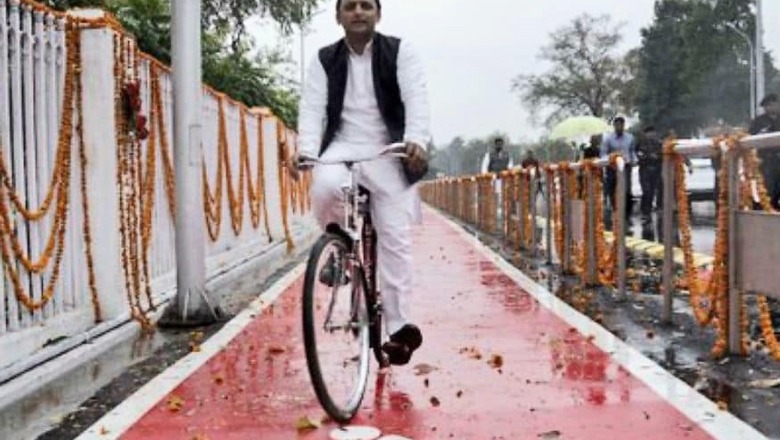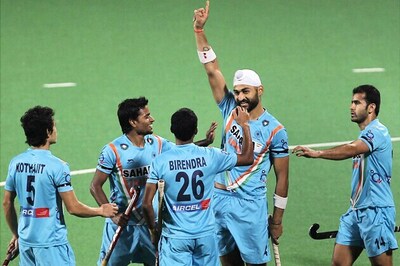
views
The road to the UP elections, or one should say the cycle-path, seems somewhat clearer once more. With the election commission’s recent decision to place Akhilesh Yadav in the riding seat, many doubts have been cleared. Although it is by no means obvious as to who will emerge the winner in one of the most important state elections in India, what is for certain is that the ramifications of the results will be felt two years down the line in the national elections. There is no dearth of quantitative analysis and breakdowns of electoral date and of course it is notoriously difficult to predict outcomes.
More often than not, it seems that the factors that determine election outcomes are as much a result of caste equations and strategic voting as the general perceptions that politicians are able to create about themselves. This is called the hawa or ‘the wind’ in villages and Modi’s success in 2014 is largely attributed by the average person to the hawa at the time. In the election this year the politics of perception will play a more substantial role because of the confusion about symbols and alliances that was only recently cleared, on the cusp of the elections.
The Samajwadi Party’s decision to ally with other parties’ inspite of getting the symbol reflects a mature and calculated decision. Indeed, allotting seats to the Congress has provided a convenient way of getting rid of MLAs aligned with Shivpal Yadav and therefore consolidating Akhilesh Yadav’s position within the party. The positives for the Congress Party perhaps even out weigh the benefits for the Samajwadi as they have obtained seats which outnumbers the seats they have had in the past few elections. In the long term, in order to be politically viable, the Congress Party needs to fundamentally restructure itself at the grassroots level.
Not only does the Congress lack dedicated political leaders in the state but it is also pushed when it comes to workers who can manage things at the polling booth level. Part of the problem is that no leadership has been encouraged at the state level because of the false logic that a potentially strong chief ministerial candidate will eventually pose a threat to the ‘high command.’ Any restructuring needs to be preceded by a clear and articulate vision beyond the platitudes of secularism, development, justice and inclusivity, as these exist in the manifestos of most other parties in some form or the other.
Additionally, this restructuring can only be done by dedicated party members and not by outsourcing the issue to public relations agencies and political consultants. A political party has to be seen as much more than a brand that needs selling. It needs a vision, an ideology and a clear direction and only someone from within can do this. This is, of course, where the BJP represents the other end of the spectrum.
The BJP, with its rhetoric of a muscular religious nationalism combined with a development agenda, has a number of grassroots workers and indeed organisations, such as the RSS, that will be able to mobilise in order to work at the booth level. However, all this talk of a grand vision can sometimes detract from the exigencies of local politics. The biggest drawback is that the party has still not projected a ‘face’ for the chief minister’s post. While more communal voices are asserting their claim to the throne, someone like Varun Gandhi would have been a wise choice for the post but then again he is perhaps viewed as too threatening by certain party members.
The reason the ‘face’ for the Chief Minister’s post is important is because Akhilesh has chosen to adopt Mamata Banerjee and Nitesh Kumar’s style of making the entire campaign revolve around the personality of the leader. This glosses over any existing stereotypes about the shortcomings of the party or its workers. Indeed this also creates the impression of a strong leader and the politics of personality are increasingly important not just in India but indeed across the world.
Mayawati has always managed the BSP so that no other centre of power emerges but she has also preferred to remain very guarded with the media. The former works well in projecting authority although her own party workers, as well as businessmen and others, complain of inaccessibility. However, dealing with the media at an arms distance is not a good strategy in today’s personality driven politics in which it plays a crucial role. Additionally, her outreach strategy for Muslims could potentially backfire as in many areas the Dalits and Muslims, both among the most marginalised groups, compete for resources and in communal incidents it is often certain Dalit sub-castes who are at the frontlines.
Despite a high number of communal incidents during its tenure, Akhilesh Yadav’s assertion of power by acquiring the symbol subtly shifts the blame for any shortcomings during his tenure of the last four years to Mulayam Singh and the various uncles.
Furthermore, anti-incumbency no longer remains a factor as a situation has been engineered whereby he has emerged victorious in a fight in which he was projected as the victim. Now, with the BJP hard-selling both demonetisation as well as surgical strikes as two major achievements, the regional parties will have many more locally resonant issues. Indeed, the BJP’s lack of a local face and therefore lack of engagement with local issues might be its undoing. RSS members have already started talking about how they will need to push ‘emotional’ issues in order to deflect attention from the perceived failures of demonetisation.
Be this as it may, in the current scenario, the alliance with the Samajwadi Party is a positive step for the Congress party, especially keeping in mind the 2019 national elections. Indeed, it made sense for the Congress to ask for fewer seats in UP so that potentially the Samajwadi can support them in a larger number of seats nationally.
Furthermore, this alliance bodes well for a possible multi-party alliance to take on the BJP in 2019 and if they are successful this year then this will certainly cause sleepless nights for the BJP as they plan for a second term. If Akhilesh Yadav becomes a two-term Chief Minister of UP, then perhaps he will be cycling to Delhi in 2019.
(The author is assistant professor, Ashoka University. The views expressed in the article are those of the author)



















Comments
0 comment